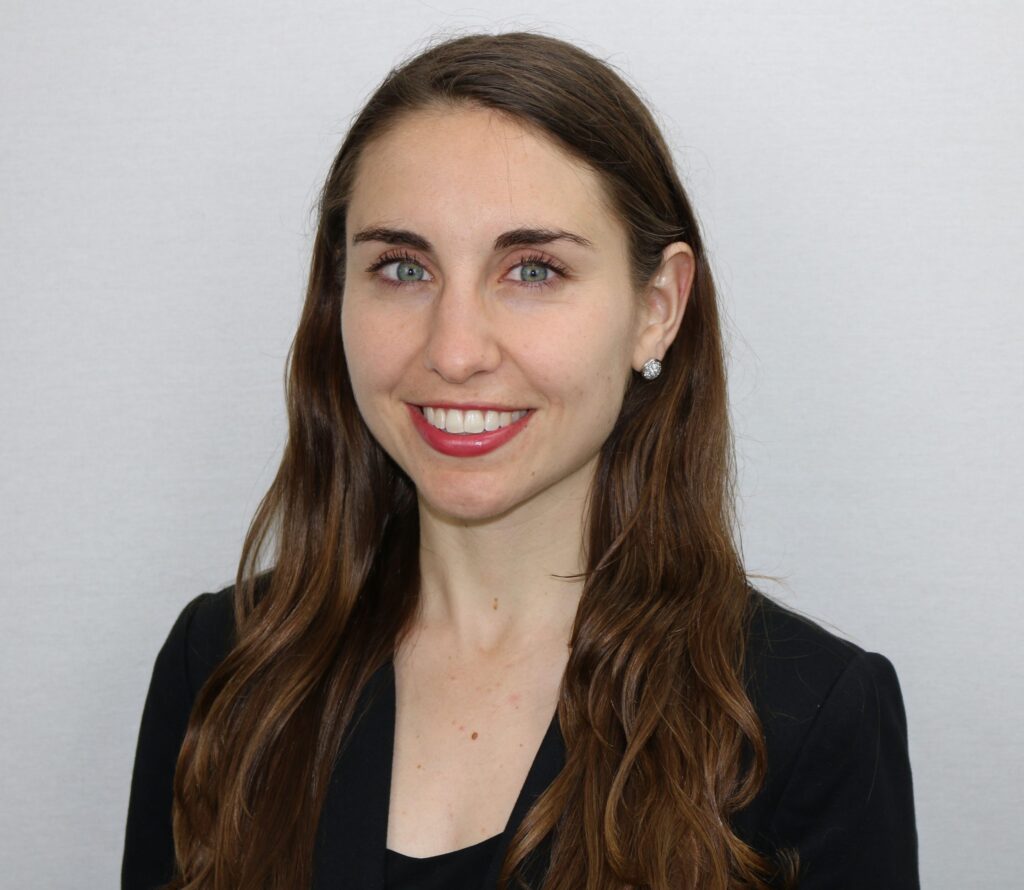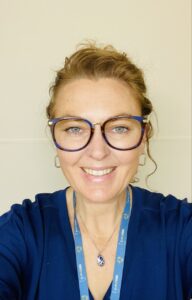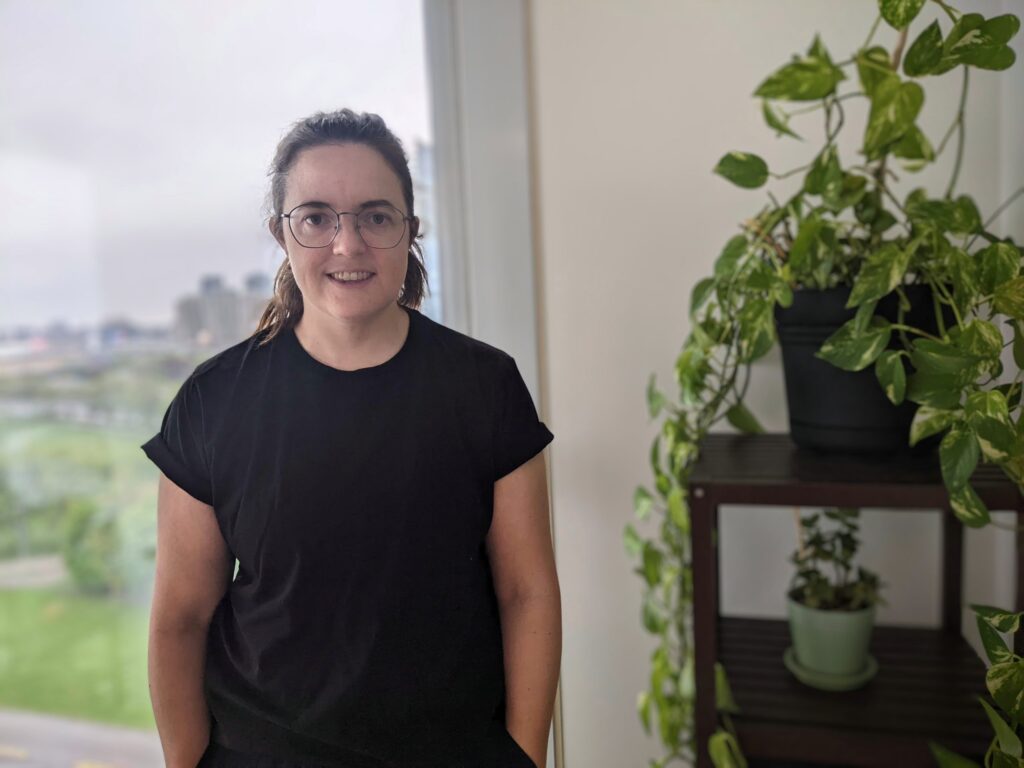Team 2: members of the Toronto Rehab - Bickle Centre

Meet the speakers!
Andria Bianchi
Click below to read their interview
Click HereNaomi Sutcliffe
Cllick below to read their interview
Click HereSiobhan McKittrick
Click below to read their interview
Click Here
Andria Bianchi
Bioethicist at the UHN, primarily with the Toronto Rehab Bickle Centre
My plan throughout high school was to become an elementary school teacher. I felt very confident that nothing would – or could – possibly alter this very concrete decision! I headed to university with this goal in mind. Perhaps unsurprisingly, I realized that I had absolutely no desire to become a teacher by the end of first year.
I currently work as a Bioethicist at the University Health Network, where I’m primarily situated at and support Toronto Rehab’s Bickle Centre. As a Bioethicist, I support patients, families, healthcare providers, staff, volunteers, etc., work through complex ethical issues that arise in relation to their care and/or work. Healthcare is complex, and circumstances often exist where people disagree about what is “right” and “wrong”, or about how to approach a particular complex issue. The role of a bioethicist is to help facilitate fair decision-making processes – to help people work through the ethical challenges that they experience and to provide ethics mediation in situations of conflict or disagreement.
The path to being a bioethicist is, unfortunately, a bit unclear, Different people become bioethicists in different ways. For me, the road to becoming a bioethicist was quite a journey with many unexpected obstacles and bumps that occurred along the way (which I can speak about during our upcoming session!). From an educational perspective, the way that I set myself up to become a bioethicist was by pursuing a BA, MA, and PhD in Philosophy with a specialization in Medical Ethics. I also pursued various clinical ethics internships at teaching hospitals across Toronto. Eventually, I was employed as a bioethicist at UHN. Again, this was not as straightforward as it sounds, and I can elaborate if you’re interested in learning more about it!
One role of a bioethicist is to support fair decision-making processes during team conversations – I want to ensure that discussions are not unfairly dominated by those in positions of authority and that all key stakeholders have an opportunity to provide their perspectives in a morally safe space.
Additionally, and as mentioned above, it is frequently the case that people (e.g., patients, families, healthcare providers) may have strong ideas about what is “right” and “wrong”. When varying perspectives about what is “right” and “wrong” exist, then conflicts can arise and it can be challenging to achieve a consensus. In these scenarios, bioethicists may help to unpack individuals’ values, goals, beliefs, preferences, and pose questions to help people consider varying perspectives and to articulate their own.
I’m not going to lie – I struggle with work/life balance! I really like biking around Toronto, so I try to do that as often as possible. I also have a part time job that differs from my career, and that’s being a figure skating instructor – being on the ice is like being at/in my second home, and it provides a lot of comfort and joy 🙂 Being on the ice & surrounded by kids is also very, very different than being in a hospital!
I would highly recommend doing informational interviews as early as possible. I would argue that most people working in healthcare – or in any industry – are open to sharing information about their profession with others, perhaps especially high school/university students. Don’t hesitate to reach out to people who are working in healthcare and ask for a brief meeting to learn about their profession. The absolute worst case scenario is that you don’t hear back from them, and it’s very likely only because they are busy and occasionally lose track of their e-mails (this happens to very well-intentioned people, I assure you!). Chances are, you’ll learn more about a profession from speaking with someone who’s working “on the ground” than from reading about it on Google. Additionally, they may introduce you to other people who are working in other professions – there exist so many careers in the healthcare/science field (I continue to learn about new careers on a fairly regular basis), and the only way to learn about them is often in these very organic ways (i.e., through conversations, introductions). Ultimately, reach out to people in the healthcare field and be open to learning! 🙂

Naomi Sutcliffe
Social worker at a transitional care unit with the University Health Network (UHN)
When I was in high school, it seemed as though everyone else knew what career they wanted to have. At 18 years old, I had no idea, and so I studied Tourism at college and became a Flight Attendant. My father was a pilot and there was an air of mystery to flight attendants (and I needed to know what that was about!). It wasn’t until my mid to late 20’s that I worked out that I wanted to be a Social Worker. The way I figured this out was by adopting the opposite mindset to the way I had originally been thinking. Instead of thinking of a job title (doctor, chef, teacher etc.), I started to think about who I was as a person, what mattered to me, and what I felt I was good at. For example I was passionate about social justice, equality and mental illness. I was also regularly told that I was good listener, and from a young age, I had been problem solving and advocating for the people around me by speaking up when I felt there was an injustice occurring. I then looked at which fields these skills and values were most relevant to.
Currently I work on a transitional care unit at UHN that was opened up in the throws of the first covid wave. It is a very busy unit, and my role there has been to work as part of a multi-disciplinary team supporting patients with a range of psychosocial concerns to transition from that unit to wherever their next destination may be. Each patient comes with a unique story, their strengths and challenges, and their social/professional support networks (or lack thereof). I work with patients to assess their needs, advocate and connect them with information or supports if necessary, provide emotional support, facilitate difficult discussions and assist the patient and their families to navigate the hospital system and community services. My goal is to continually grow personally and professionally, and to undertake an array of learning opportunities and challenges. I believe in ‘leaning in’ to the direction that you want your life or career to go, and being open to that trajectory changing as you learn more about yourself and other opportunities present themselves.
After completing a bachelor of social work (BSW), I began working in the community at a refuge for women who were homeless and/or escaping violence. Additionally I worked at a telephone counselling service. I learned a lot from both of these positions, including the fact that both roles (for their own reasons) were not sustainable for me in the long term. The former lacked structure and required me to work an unlimited number of unpaid hours a week, and it was impossible to self care and to aim for a work–life balance. The latter role of a phone counselor I really enjoyed, however counselling for 8–10 hours straight per day, five days a week did not provide much of a balance in terms of job tasks, and I was interested to expand my professional work experiences. Hence I completed a master of social work (MSW) and decided that I would like to work in a hospital. Having grown up in an aviation-oriented family, I loved the airport for the diversity in why people were there, where they were going, if they were sad and saying goodbye, or excited about a vacation etc. I saw a hospital setting as the ‘airport’ of social work. It was a highly structured environment, yet with each day presenting new challenges and myriad enriching learning opportunities.
I like to think that I bring to my team the perspective of a situation as seen through the eyes of the patient or through a social work lens. A person’s physical health is inextricably related to their social environment, hence the term ‘social determinants of health.’ The social disadvantages that we are often born into (relating to factors such as income and social status, education and literacy, and access to social or community support) have a direct impact on our health, and overall quality of life. I try to help the team connect these structural factors to the patient’s current health concern.
Well, it has been an interesting few years, so I need to find my new normal again. I spend time with my family and friends, I love a good lake, a good glass of red, and a good laugh. I also hope to find a creative outlet this year when things settle down as a little voice inside of me keeps asking me when I will make time for my creative side to express itself (my exercise self has also been screaming☺). “Soon!” I say to both.
There are a lot of opportunities in healthcare, and many of the skills are highly transferable from hospital to hospital, often even from country to country. If you are looking for which career ‘speaks to you,’ please read my response to question #1. If you are looking more for financial stability and are not driven to feel passionate about what you do, then I would look at work trends and consider which jobs that will be in high demand when you finish your studies.

Siobhan McKittrick
Physiotherapist and interprofessional educator at the UHN & Toronto Rehab Bickle Centre
I had an interest in Science and played a lot of sports – I wanted to combine the two and I went on to study Athletic Therapy as my undergraduate degree. I originally wanted to work in the sports environment in regards to injury and sports performance and found this initial career rewarding, however, after going on to get my Master’s in Physiotherapy, I realised how fascinating neurological physiotherapy (rehabilitation of people after neurological injuries such as stroke, spinal cord injury, traumatic brain injury etc) was, and decided to pursue a career in this area.
Currently, I spend half of my week as a physiotherapist – clinically treating patients in a rehab hospital environment, and I specialise in consulting on complex neurological conditions. For the other half of my week, I am an interprofessional educator at the same rehab hospital and this involves many different things – orienting new staff to the hospital, facilitating educational monthly rounds for all the staff, educating staff on specific needs that might come up in regards to best practice and care, assisting in quality improvement projects.
As I have progressed in my physio career I have specialised in treating neurological injuries and have taken additional courses for this. With this extra training and experience gathered from my career working in specialised neurological areas, I have found myself more recently being in a clinical educator role for my peers and for student physios.
I applied to the interprofessional educator role to grow my skills in being an educator, not just for clinical physiotherapy, but generally in a healthcare setting.
I have experience of working in a different province and also from healthcare settings abroad and I think this is helpful in providing a different perspective and lens which can sometimes facilitate change.
Outside of work I like to be outdoors – playing sport, camping, hiking. This helps to decrease stress and take my mind off work concerns when things are busy.
Be open to, and look to gain experience in different areas – it was only when I coincidentally had 3 placements in a neurological specialised area that I realised how much I liked the area of work. There are a lot of healthcare areas that you may not know of that can open doors to a rewarding and interesting career.
